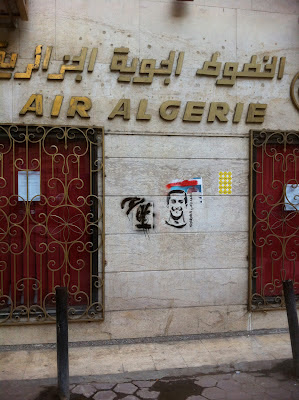On my first visit to Cairo since last
year’s popular uprising overthrew Hosni Mubarak following three decades of rule,
I was inspired and moved, sometimes to tears, by the graffiti and public art
that now decorate the city.
Campaign materials strewn across the city
by key candidates in the country’s first free presidential election also took
me aback. The last time I visited in September 2010, only photos of the
long-time dictator, or his wife and heir-apparent, could be seen adorning
Cairo’s streets.
Since the uprising that started in January
2011, Egyptians have reclaimed the streets from their oppressive rulers, and
artists, both experts and amateurs, have painted on the walls of the grand
Egyptian capital sketches capturing a plethora of opinions and emotions.
Some cry out against decades of military
rule. Others capture the anguish endured by the mothers and families of youth
killed during the 18-day revolt that left more than 800 people dead at the
hands of Egyptian security forces.
Some capture the faces of martyrs in a
form of timeless memorial. While stopping to behold public art along a street in Heliopolis, a friend and I ran into a gentlemen who lamented the unjust deaths of “youth,
such as flowers," before he and my friend embraced and shed tears. The man expressed genuine anguish at the prospect that the voices of
these youth would be lost if the presidential election victory went to a member
of the previous regime. I saw similar sentiments expressed in graffiti near my polling station near the Pyramids.
There are works that express hope and immense scepticism for the country's political future on streets, such as Mohamed Mahmoud near Tahrir (Liberation) Square in central Cairo, where battles between unarmed civilians and security forces in January and February 2011 left hundreds dead. A sombre sensation came over me as I visited Tahrir and examined the graffiti along Mohamed Mahmoud on June 15, fulfilling a wish to visit heart of Egypt's uprising on my birthday.
An overwhelming expression of love for Egypt and
patriotic spirit inspires much of the artwork I saw during my week-long visit to the Egyptian capital. The various displays of creativity brought to mind a line from the
poignant song “Ya Beladi” (Oh My
Country) that was dedicated to Egypt’s martyrs last year. In the song, a martyr sings:
While I've included a small sample of the public art here, it truly demands a visit to Cairo to fully grasp the magnitude of the revolutionary spirit that now fills the streets of this grand city.
“They tell me, ‘Enter Paradise.’
I say, ‘Paradise,
is my country’.”
While I've included a small sample of the public art here, it truly demands a visit to Cairo to fully grasp the magnitude of the revolutionary spirit that now fills the streets of this grand city.




























